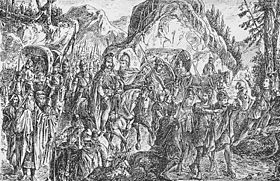الأرخون المجهول
| الأرخون المجهول | |
|---|---|
 |
|
| معلومات شخصية | |
| الميلاد | القرن 6 صربيا البيضاء |
| الوفاة | سنة 652 إمارة صربيا (العصور الوسطى الباكرة) |
| الديانة | الوثنية السلافية |
| الأب | ديرفان |
| الحياة العملية | |
| المهنة | حاكم ، وعاهل |
| تعديل مصدري - تعديل | |
الأرخون المجهول (بالصربية: Непознати архонт) هو اسم تقليدي أعطاه المؤرخون إلى الزعيم الصربي الذي قاد الصرب البيض من موطنهم الأصلي في منطقة لوساتيا ليستقروا في البلقان بعد عام 610، في عهد الإمبراطور البيزنطي هرقل (610–641).
يوجد السجل الرئيسي لهذا الشخص في كتاب De Administrando Imperio، وهو كتاب مكتوب في خمسينيات القرن العاشر بواسطة الإمبراطور قسطنطين السابع بورفروجنيتوس. يُوصف هذا الزعيم بأنه خليفة مع شقيق له مجهول (ديرفان وفقًا لجدول زمني تاريخي) لملك صربي وأن له دورًا قياديًا مع الصرب حيث قاد صربيا البيضاء في عهد الإمبراطور هرقل. وفي طريقهم للجنوب هزموا الآفار، قبل الاستقرار في النهاية في سيرفيا (لا يزال هذا المكان يحمل نفس الاسم)، وأيضًا في المناطق النائية من سالونيك، وهي مقاطعة أعطاها لهم هرقل ووكل لهم مهمة حماية بيزنطة من التهديدات المستقبلية، مثل الآفار.
ترك الصرب المقاطعة وانتقلوا شمالاً، حتى وصلوا إلى بلغراد حيث أعطاهم القائد العسكري (الستراتيجوس) لمقاطعة ثيمة مناطق راشكا وترافونيا وزاخلوميا وباكانيا وكونافله [1] (السلاف البيزنطيون) بعدما أقسموا بالولاء للإمبراطور. تاريخ وفاته غير معروف، ومع ذلك فهو معروف أنه قبل وصول البلغار في البلقان (681).
أول عائلة مالكة صربية كانت سلالة فلاستيميروفيك، التي سميت على اسم فلاستيمير، وهو أمير من سلالة لأرخون (حاكم) غير معروف.
المراجع[عدل]
- ^ De Administrando Imperio, ch. 31: «
- But when two brothers succeeded their father in the rule of Serbia, one of them, taking a moiety of the folk, claimed the protection of Heraclius, the emperor of the Romans, and the same emperor Heraclius received him and gave him a place in the province of Thessalonica to settle in, namely Serbia, which from that time has acquired this denomination.
- Now, after some time these same Serbs decided to depart to their own homes, and the emperor sent them off. But when they had crossed the river Danube, they changed their minds and sent a request to the emperor Heraclius, through the military governor then governing Belgrade, that he would grant them other land to settle in.
- And since what is now Rascia (صربيا) and Pagania and the so-called country of the Zachlumi and Trebounia and the country of the Kanalites were under the dominion of the emperor of the Romans, and since these countries had been made desolate by the Avars (for they had expelled from those parts the Romans who now live in Dalmatia and Dyrrachium), therefore the emperor settled these same Serbs in these countries, and they were subject to the emperor of the Romans; and the emperor brought elders from Rome and baptized them and taught them fairly to perform the works of piety and expounded to them the faith of the Christians.
- And since Bulgaria was beneath the dominion of the Romans * * * when, therefore, that same Serbian prince died who had claimed the emperor's protection, his son ruled in succession, and thereafter his grandson, and in like manner the succeeding princes from his family.”»
| في كومنز صور وملفات عن: الأرخون المجهول |
